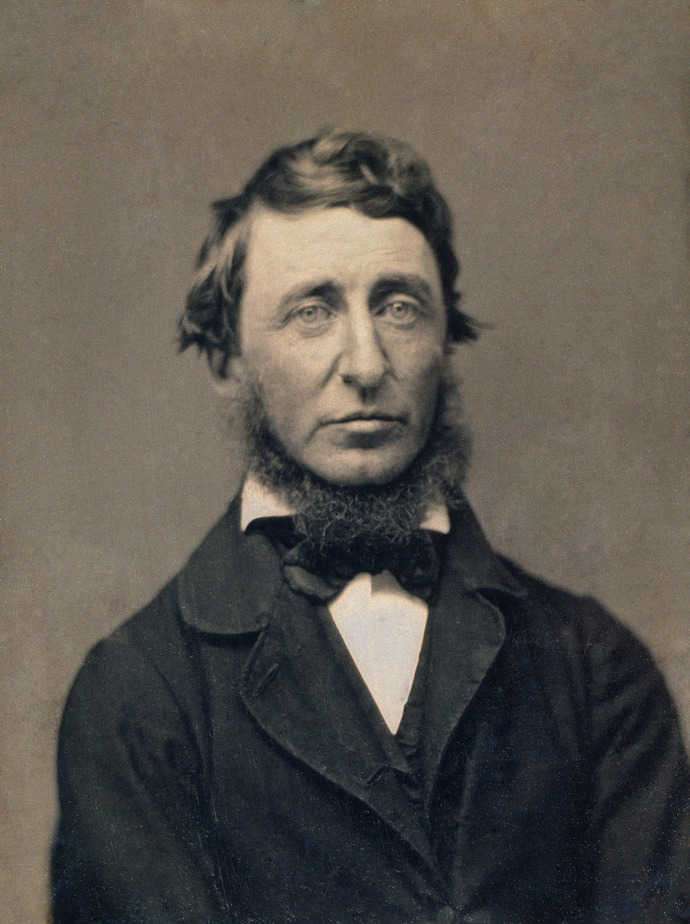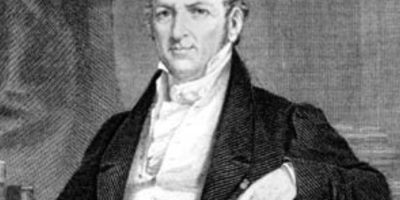
Henry David Thoreau Photo By National Portrait Gallery – Wikimedia Commons
Originally published by Philipp A on February 2022. Edited by Charity K on May 2023.
Top 15 Facts about Henry David Thoreau
Henry David Thoreau was a philosopher, environmental scientist, and poet. He is widely known for his book Walden, about simple living, and his essay ‘’Civil Disobedience’’ which later greatly influenced revolutionists such as Mahatma Gandhi and Martin Luther King Jr.
He was born in Concord, Massachusetts. His father was John Thoreau, a pencil maker, and his mother was Cynthia Dunbar. His paternal grandfather Asa Danbury led the first recorded student rebellion in Harvard in 1766 known as the ‘Butter Rebellion’
Henry had two older siblings; Henry and John Jr and one younger sister, Sophia Thoreau
The following are the top ten facts about Henry David Thoreau;
Click here to read more about historical figures.
1. He invented the grinding machine to improve pencils
Thoreau’s father began producing black-lead pencils in the 1820s. Thoreau earned money while teaching students, surveying land, and working as a handyman for his family’s pencil business.
While working in the family business Henry researched German techniques for making pencils. Equipped with the information he’d researched Henry invented the machine that made better quality plumbago [a mixture of lead, graphite, and clay that’s put in the pencil]
2. He started a forest fire at the age of 26 years

Forest fire Photo By Karsten Winegeart on Unsplash
Henry David Thoreau accidentally started a major forest fire in the Concord woods on April 30, 1844, when his campfire grew out of control. Henry was cooking fish that he had caught with his friend outside Concord when the grass caught fire.
The fire spread so fast aided by the wind that it destroyed 300 acres of forest and nearly destroyed Concord. The local newspaper, The Concord Freeman, estimated the damages at over $2,000 and indirectly chastised Thoreau for his “thoughtlessness.”
Thoreau recounted the event in a lengthy journal entry dated May 31, 1850, in which he explained why he felt no remorse for starting the fire. His neighbors called him a rascal and a wood burner, which according to him, continued even years later after the incident was a thing of the past.
3. Henry and his brother proposed to the same woman

Ellen Sewall Photo By Unknown – Wikimedia Commons
Thoreau wrote in his journal in 1839 about falling in love with Ellen Sewall, an 18-year-old from Cape Cod. Thoreau’s older brother John proposed marriage to Sewall in 1840, but she declined.
So, as with any good brother, Thoreau wrote Sewall a letter proposing that she marry him instead. Sewall also rejected him, most likely because her family disagreed with Thoreaus’ liberal views on Christianity.
Despite the marriage proposal, some historians and biographers believe Thoreau was homosexual. He never married and reportedly preferred celibacy, and his journals contain references to male but not female bodies.
4. He was a minimalist
Thoreau wrote about the benefits of living a simple, minimalist lifestyle long before tiny houses became popular. He wrote in Walden about giving up the luxuries of everyday life in order to quiet the mind and have time to think. “My greatest skill has been to want but not have much,” he wrote. Thoreau’s love of simplicity was also related to the craft of writing: “It is the fault of some excellent writers… that they express themselves with too much fullness and detail.” They give the most accurate, natural, and lifelike account of their mental and physical sensations, but they lack moderation and sententiousness.”
Read more on famous poets here.
5. He led a social life
Henry led a social life despite a popular misconception that he was a loner.
Henry was an individualist who was close to his family and he also sometimes lived with Emerson’s family [he taught Emerson’s children when he stayed with the Emerson’s amid looking for freelance writing work for magazines while he was with them].
While living in the forest, Henry entertained guests and visited friends. A huge gathering of his friends came to his burial to mourn him and to commemorate a life well lived.
6. He was a member of the Boston Society of Natural History.
Henry, even after his death donated his bird collection, more than 1000 plant species, bird eggs, and bird antiquities. The North American antiquities included stone weapons that he had collected during his walks in Concord.
7. He spent a night in jail after he failed to pay the poll tax
Jail Photo By Craig Clark on Pixaby
Henry said that jail felt freer than the outside world, a night after he spent one in jail.
This later influenced him to write an essay known as “Civil Disobedience”. This essay, later on, came to influence a lot of revolutionists such as Martin Luther King Jr and Mahatma Gandhi.
Click here to read more about historical figures.
8. His house at Walden Woods became a pigsty
Thoreau’s home in Walden Woods went through several iterations after he left it in 1847. He sold the house to Emerson (who already owned the land), and Emerson sold it to his gardener. The gardener never moved in, so the house sat empty until 1849 when it was purchased by a farmer named James Clark.
Clark relocated it to his neighboring farm and used it to store grain. In 1868, the building’s roof was removed from the foundation and used to cover a pigsty. The remainder of the structure was used as a shed before its timber was used to repair Clark’s barn in 1875. Today, replicas of Thoreau’s house can be found near Walden Pond in Massachusetts.
9. People found it difficult to pronounce Henry David Thoreau’s name

Henry David Thoreau Photo By University of California – Wikimedia Commons
In Thoreau’s lifetime, his name was pronounced with emphasis on the second syllable; the-ROH.
However, sometime later Ralph Waldo [Emerson’s son] wrote that the emphasis was on the first syllable. Amos Bronson Alcott [father of novelist Louisa May Alcott] wrote that the name should be pronounced like the word ‘thorough’ in American English this made his other friends call him ‘’ Mr Thorough”.
10. He reversed his name after graduating from Harvard

Signature By Henry David Thoreau – Wikimedia Commons
His given name was NOT Henry David Thoreau. His given name was David Henry Thoreau, after his father’s brother, David, who had died.
After graduating from college, the famous writer reversed his name and began calling himself Henry David. He never changed the order of his given nomenclature legally and remained legally as David Henry Thoreau. Henry switched his first and middle name; David Henry to Henry David.
11. Speculation Regarding His Sexuality
Even though proposed to Ellen Sewall, scholars have called him heterosexual, homosexual, or asexual. Thye suggested that homoerotic sentiments were run through his writings and concluded that he was homosexual.
One scholar suggested that he wrote the poem to Edmund because he couldn’t bring himself to write it to Edumund’s sister Anna. It has been argued that the long paean in Walden to the French-Canadian woodchopper Alek Therien.
12. He was Influenced By Indian Texts
Henry was influenced by Indian spiritual thought and there are multiple references to the texts of India. On various occasions, he followed Hindu customs including a diet that consisted of rice. He also played the flute and did yoga.
13. His Influence on Public Figures

Cecil Stoughton, White House, Public domain, via Wikimedia Commons
Henry influenced many political leaders and reformers like John F. Kennedy, Martin Luther King Jr, and William O. Douglas. As well as Edward Abbey, Marcel Proust, E.B. White, Frank Llyod Wright, John Burroughs, Edwin Way Teale, Gustav Stickley, and Alexander Posey.
In 1890, Henry Stephens Salt, an English writer, wrote a biography of Henry that popularized his ideas in Britain. Thoreau’s friend, William Ellery Channing, published his first biography called Thoreau the Poet-Naturalist in 1873.
14. He Has Faced Criticism
Henry was an advocate of non-violent resistance while he also defended the action of violence. Critics disagreed with him because of the clash of logic. Many ignored his politics because they were considered inconsistent.
15. The Legacy of David Thoreau
Thoreau established the tradition of nature writing and is remembered as an important contributor to the American literary and philosophical movement which is known as New England transcendentalism. David’s books, essays, and poems create two central themes over the course of his intellectual career.
He is known for his famous essay Civil Disobedience which later inspired the world leaders Mahatma Gandhi and Martin Luther King Jr.
Click here to read more about historical figures.
Planning a trip to Paris ? Get ready !
These are Amazon’s best-selling travel products that you may need for coming to Paris.
Bookstore
- The best travel book : Rick Steves – Paris 2023 – Learn more here
- Fodor’s Paris 2024 – Learn more here
Travel Gear
- Venture Pal Lightweight Backpack – Learn more here
- Samsonite Winfield 2 28″ Luggage – Learn more here
- Swig Savvy’s Stainless Steel Insulated Water Bottle – Learn more here
Check Amazon’s best-seller list for the most popular travel accessories. We sometimes read this list just to find out what new travel products people are buying.










